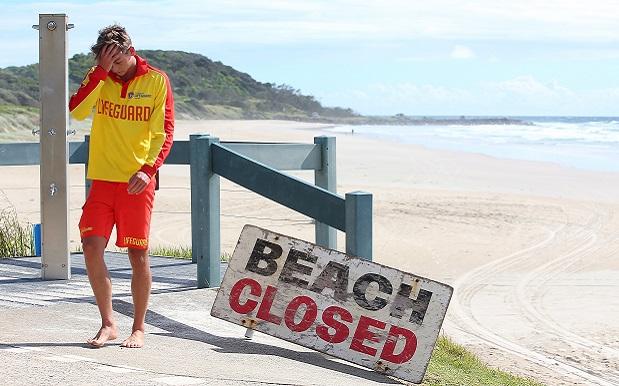
Shark nets, intended to deter the marine predators from chomping down on swimmers, are a common and controversial feature up and down the east coast of Australia, and have been for decades.
Tonight, The ABC’s Four Corners will air an interview with Laurie Laurenson, an associate science professor at Deakin University, who has concluded that, after researching 50 years’ worth of shark data, the nets do bugger all to reduce attacks.

Laurenson’s controversial findings are based on a three-year study of figures relating to shark mitigation programs and coastal populations both in NSW and in South Africa, parts of which also use a netting system to prevent attacks.
Laurenson told Four Corners that in his view, reducing the density of a shark population via a system like netting does nothing to reduce the overall number of attacks in an area. He said:
“I can show statistically that there is no relationship between the number of sharks out there and the number of shark attacks. It’s just simply not there … I’m surprised that it’s not there, but it’s not there.”“We could not demonstrate a statistically significant relationship between the density of the sharks and the number of attacks in the localised area around Sydney where there have been historically large numbers of attacks and there [have] been large numbers of mitigation programs.”“Intuitively, you would expect if there are fewer sharks out there, there’s going to be fewer attacks. We can’t show that,”
Shark attack numbers have doubled in Australia since the 1980s, but the number of fatalities on beaches that use deterrents like nets and drum lines has gone down significantly.
Rather than shark nets, Laurenson credits the reduced number of fatalities to improved medical intervention, saying:
“If you look at how far medical intervention has come since the 1960s, they are very, very, very good at it. The reason there’ve been no fatalities is because of earlier responders having sufficient training, having the right equipment, knowing exactly what they want to do. They get there early. They get people to the hospitals quickly.”
Many in the science community still stand behind shark nets as an effective deterrent, including NSW chief shark scientist Dr Vic Peddemores, who says he is “absolutely confident” that they work,
The CSIRO have likewise stood behind shark nets’ ability to reduce risk, with shark expert Dr Barry Bruce saying:
“Shark nets certainly reduce risk because they catch and kill sharks that have the potential to bite people. I guess what we don’t know – we may never know – is to what extent the overall risk has been reduced by losing that shark. From a ‘whole of’ perspective the answer is probably ‘no’, but do they reduce risk at the particular areas that they’re put in? The answer’s probably ‘yes’, but we don’t know by how much.”
There have previously been calls for the scrapping of shark nets thanks to the significant impact they have on marine life, catching numerous dolphins, rays and turtles and killing a whale in Queensland in 2014.
Four Corners will air its interview with Laurenson tonight at 8.30pm on the ABC.
Source: ABC News.
Photo: Getty / Chris Hyde.



